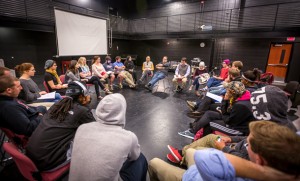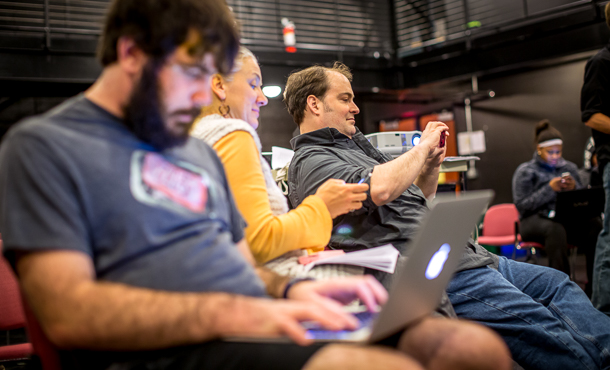The story of a man with 107,000 Twitter followers – famous for publicizing the “Arab Spring” via social media – has been dramatized by Eastern Mennonite University faculty and students.
Andy Carvin, then working at NPR in Washington, DC. played “distant witness” to events documented via Tweets by “citizen journalists” in Tunisia, Syria, Egypt, Libya and other Middle Eastern countries from December 2010 into 2012. In 2013, Carvin published a book by the same name. EMU theater and social media classes, led by professors Justin Poole and Paulette Moore, initially adapted the book for the stage in the fall of 2014.
Workshop performances on Friday, May 8, and Saturday, May 9, represent a more formalized scripting. Both events, which are free and open to the public, begin at 7:30 p.m. in the Studio Theater on campus and will be followed by a talkback with Carvin and the play’s creators.
The event is co-sponsored by EMU’s Center for Justice and Peacebuilding and the Valley Arts Council. The latter has granted funds through the Advancing the Arts Grant Award to develop a full-fledged play that will debut in the spring of 2016.
An ensemble production
The creation of the “Distant Witness” play has merged multiple interests and specialties of its co-creators. Poole, who developed most of the current adaptation, had previously worked in cross-cultural theater and specifically with Arab culture organizations.
“I’d been wanting to do a project on the Arab Spring for some time,” Poole says, adding that he visited Egypt mere months before the uprisings began. “I witnessed a lot of class tensions. This prompted my interest in what those tensions might mean.”
Poole became involved in the fall of 2014, when professor Paulette Moore, on behalf of students in her “Social Media” class, invited the campus community to a Skype interview with Carvin. (Moore had met Carvin at a Washington, DC. conference and had been using his book in her courses as required reading.)
Poole and Moore decided to integrate the social media class with Poole’s “Devised Theater” class, in which students are taught the principles of ensemble play development. Eventually, the two professors pitched the idea of adapting the book for the stage to Carvin.

“He was very receptive [to the idea] and gave us some feedback on how to frame it immediately,” Moore said.
Groups of students in the combined class were asked to explore specific sections of the book through various improvisational exercises, research and discussions – the results of which helped Poole write the play later. Throughout the process, students shared their experiences through live Tweets. Carvin followed the students’ progress via the social network and responded to their questions.
“Andy ‘dropped in’ virtually to one of the early classes unexpectedly and then showed up regularly thereafter,” said Moore. “It was pretty thrilling for the students.”
In an interview with EMU news, Carvin applauded this cross-disciplinary creativity. The play “does justice to the Tweets that were written in real time,” he said. “It shows the authors were actual people calling for the world to bear witness to their reality.”
Each week, Carvin saw the students beginning to gain a better understanding of “the circumstances in which the revolutions were happening in the Arab world.”
Tweeting is also a good way to illustrate how journalism is changing, he said, adding that 140-character Tweets may have as much impact on the world community as traditional journalism.
Audience immersed in media-rich environment
Both the production in the fall, which occurred during Poole’s class final, and the spring workshop are what Poole calls “hybrid” productions. “It is designed to be a totally immersed experience for actors and audience,” he said, in words that evoke a living IMAX production.
The performance is in the round and will combine videography, streamed YouTube videos (taken from actual footage by citizen journalists in the Middle East), dialogue adapted from the book, Tweets from people during the Arab Spring, and live streaming of both audience and actors.
The actors are students from both Moore and Poole’s classes who are staying on campus for two weeks after the semester ends to participate in the production. Moore said he hopes a few volunteer actors from the Summer Peacebuilding Institute, which includes approximately 50 peacebuilders from 20 countries, will join the production.
As for the audience experience: “I hope that the viewers come away from the experience of watching this piece with a better understanding of the Arab Spring,” Poole said. “I want to humanize these stories. I want to bring these stories close to home. I think plays are a really great way for people to learn how to be empathetic with people from other cultures and to break down cultural boundaries.”
